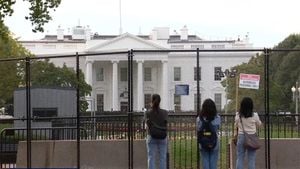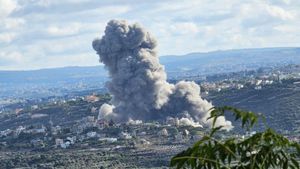Recent escalations along the Israel-Gaza-Lebanon border have heightened tensions once again as military actions ramp up. The conflict has particularly escalated since Hamas's surprise attack on October 7, 2023, which plunged the region back to the forefront of global media coverage and sparked significant military responses.
On one front, Israeli airstrikes continued to rain down on Gaza, reportedly killing over 50 individuals. These airstrikes mark just the latest attempt by the Israeli Defense Forces (IDF) to dismantle Hamas’s military capabilities, which they’ve stated are aimed at curtailing threats against the Israeli people. The violence has led to massive humanitarian crises, including severe shortages of food, water, and medical supplies for Palestinians living within the impoverished enclave of Gaza.
Meanwhile, airstrikes have not been limited to Gaza. On November 6, 2024, the IDF also targeted locations within Lebanon, believed to be associated with Hezbollah—the Iranian-backed militant organization. Reports indicated at least 28 Lebanese were killed amid accusations of Hezbollah launching attacks on Israeli positions. This volatile situation fuels fears of a second front opening against Israel, increasing the chances of broader regional instability.
The international community is voicing concern over these latest military actions, with many countries urging restraint. The United Nations issued warnings about the scale of casualties and the dire humanitarian situation, asserting, "The violence must cease immediately for the sake of innocent lives on both sides." Despite these calls, both Israel and Hamas have expressed intentions to continue their respective military campaigns.
Adding to the complexity of the conflict, Israel’s recent legal measures have raised eyebrows globally. The Knesset passed legislation permitting the deportation of family members of individuals accused of attacks against Israelis. The new law applies to Palestinian citizens of Israel and residents of East Jerusalem if they allegedly knew about or supported family member’s actions, allowing for their deportation to Gaza or another location for periods ranging from seven to twenty years.
This legislative action has received backlash from various legal experts, including Dr. Eran Shamir-Borer, who asserted, "This is fundamentally unconstitutional and conflicts with Israel's core democratic values." Observers note the potential for legal challenges, with critics arguing the law targets individuals based on their familial associations, which many view as deeply unjust and ineffective.
This legislation also highlights the fraught nature of daily life for Palestinians, who make up roughly 20% of Israel's population. While holding citizenship and the right to vote, many Palestinians face systemic discrimination and have close familial ties across the borders of conflict. The tension is palpable as protests erupted among communities opposing the law, sparking sporadic clashes with authorities.
The historic backdrop of these tensions can’t be ignored. Israel captured Gaza, the West Bank, and East Jerusalem during the 1967 Mideast War, sectors of land Palestinians envision for their future state. Since then, the situation has waxed and waned, with several explosive flare-ups and attempts at ceasefire, only to be overshadowed by renewed violence.
Meanwhile, amid the chaos, the humanitarian cost for civilians continues to rise. According to estimates from various charities, the civilian death toll has reached staggering heights, with tens of thousands now displaced, reflecting tremendous societal suffering. Children and elderly populations, who have been hit disproportionately hard, continue to bear the brunt of the conflict’s incessant violence.
Simultaneously, other regional stakeholders monitor the developments closely. Iran has pledged its support to both Hamas and Hezbollah, and their engagement could spell out broadened complications for not just Israel, but also the neighboring states of Lebanon and Syria.
Conversations of peace appear distant amid the rhetoric of military necessity. Previous ceasefire negotiations, brokered with international intervention, have foundered on the rocks of lack of trust and retaliatory attacks. The stakes are high as all parties involved seek to position themselves advantageously amid the shifting political landscapes.
The situation remains precarious as the international community stands witness, urging diplomatic avenues to be explored even as the realities on the ground paint a starkly violent picture. With the potential for escalated hostilities looming, the hopes for de-escalation rest precariously on the negotiations yet to be seen.
Following the burst of conflict, the call for action among international rights organizations has become louder, demanding accountability for the loss of civilian lives and the need for long-term strategies to address the core issues of this historic conflict. Many experts remind us of the necessity of tackling the root causes integrated deeply within the socio-political fragments of the region.
Understanding the multifaceted nature of this issue is imperative for those seeking clarity amid chaos. Many stand ready to analyze the ramifications of each session of violence as it begets subsequent acts, creating complex cycles often impervious to reasoning.
On such fronts, academic voices stress the importance of acknowledging narratives from both sides, calling for workshops and dialogue-centered initiatives. Yet, with the current escalation of military actions, those pleas seem distant, perhaps drowned out by the sirens and smoke claiming the narratives of innocents caught in the crossfire.



